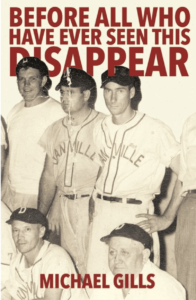

Before All Who Have Ever Seen This Disappear, Michael Gills' fifth novel, plumbs the depths of the Stepwell family tendency toward theatrical catastrophe. When Weldon Stepwell, bare-knuckled catcher for the Danville Little Johns and town florist, has his leg amputated in a wood-cutting accident, the team shows up on the hospital lawn to give blood, pray, and curse God. Mostly they gather to be with the stricken wife, daughter, and son and wait to see if their teammate will live through the night. One teammate is sent to retrieve the leg, and just what on earth do you do with such a thing? Rural Arkansas in 1950, they are men who'd just whipped Hitler and come home to play ball, volunteer firemen, rural mail carriers, the stray senator-to-be, hardware store workers, and fish farmers. Spanning three generations, they just can't seem to outrun whatever it is that stalks their periphery. Finally, an adult grandson must contend with the Stepwell business in the form of a plague that comes on them and the world from nowhere. Quarantined between a gleaming football stadium on one side of the road and the city cemetery on the other, a moment comes when they must walk out under the sun and re-commune. A story that dives as deep as you like into the abyss, then fights its way out with all the hope and grace this life allows.
 Dialing the three previous novels' tendency toward theatrical catastrophe up to 11, Michael Gills' concluding effort to the Go Love Quartet traces the Stepwell history of hurt and tragedy and loss, arriving at, if only temporarily, a fragile harmony that allows the present to be reconciled with the past.
Dialing the three previous novels' tendency toward theatrical catastrophe up to 11, Michael Gills' concluding effort to the Go Love Quartet traces the Stepwell history of hurt and tragedy and loss, arriving at, if only temporarily, a fragile harmony that allows the present to be reconciled with the past.Pursued west, Edgar Paris can't outrun his past. He ends up in an Arizona jail for, "defamation of distinguished persons as manifest at heritage sites," not to mention slander and assault on an officer of the peace. Joey Harvell must bring Edgar home but before they return the two will have to confront the bloody legacy of Navajo Bridge, aka John Doyle Lee Bridge which was originally named for the lone man convicted for the Mountain Meadows Massacre, the single worst mass murder of whites from Manifest Destiny.
Threading the three previous books' violence across generations, the Harvell family tries for all they're worth to make a home with roots in foreign ground, just as the ill-fated Fancher party had, and Mormons who'd retreated from Missouri, and the endless emigrants who ever walked west toward the promise of a new life. New Harmony culminates the Quartet by trumpeting its namesake: Go Love. In a life that offers up truckloads of reasons to do the contrary, love remains the one buoy that will ever rescue us from perishing. Even if it kills us, go love.
